Wednesday morning began with a three hour meeting at the headquarters of the Chamber of Agriculture, arranged by Edita Karbauskiene, with about 30 organic farmers (from large farms to hobbyists), professors, members of the Chamber of Ag., and members of the press represented. The meeting was scheduled for three hours, and despite worries that we wouldn’t be able to fill up that time, the time needed for translations and seed swapping activities extended things to a record-braking four hours!
Keeping our spiel interesting and relevant for such a diverse group was somewhat difficult, but also rather fun. We began with a discussion of the Seed Ambassadors Project, then talked about the seed scene in the other countries we have visited, focusing on ideas that could be beneficial to the organic seed scene in Lithuania. Because certified organic seeds are slim pickin’s in Lithuania, we found ourselves promoting that the farmers exchange seeds amongst themselves, and described specifically the Seed Savers Exchange (SSE) model. Many people seemed to embrace the idea for their own personal gardens, but the SSE model doesn’t work for farmers, who need to cite certified sources for their seeds.
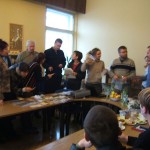
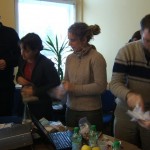
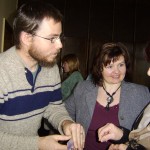
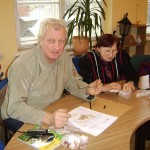
Photos, from left to right: 1. and 2. Sarah, Kayla and Andrew sharing seeds and discussing varieties with some atendees of the meeting at the Chamber of Agriculture. 3. Andrew receiving Lithuanian Walnut seeds, with translation help of Edita. 4. Some of the meeting participants checking out and divying up their seeds.
We learned from this meeting that in some ways, Lithuania is a few steps ahead of the US as far as facilitating farmers’ access to Certified Organic Seeds: a Chamber of Agriculture sponsored database of Lithuanian Organic Varieties is in the works, and already enough information has been compiled to assist farmers in their quest of OG seeds. We referred people to the Organic Seed Allicance’s Seed Producers Database, still in its infancy, for comparative purposes. (Another American organic seed database can be accessed at the Organic Materials Review Institute site.)Other discussions included the urgency of developing and professionalizing the Organic Seed industry and what is happening in other countries along these lines, as well as the current state of the organic seed industry in the US. We also discussed the general (environmental, sustainable, food security) importance of organic, open-pollinated seed.
We shared about breeding projects that we are involved in and seed-saving techniques that we utilize by presenting a slide show of our scene in Oregon.
The afternoon had us at the Lithuanian University of Agriculture, discussing our project and sharing seeds with with seven or eight Ag. professors. This meeting was much shorter and easier because our audience was smaller and more focused. The professors gobbled up the seed that we had to share more eagerly than at any other presentation we have given so far — several of them made sure they collected a sample of every variety available, and others were especially interested in the perennial grains we had to offer.
Afterwards, one of them took us to her classroom and the horticulture lab and showed us their preserved examples of just about every vegetable imaginable. She also taught us a new way to fold paper seed packets — a technique that we are very excited to utilize. She showed us some winter squash varities that we had never seen first-hand, and explained about a particular squash (a Cucurbita moschata) that you can chop off the growing end of the fruit to eat while it is growing, and a new growth tip will regenerate, allowing for multiple harvests. Another professor shared with us some of her favorite Polish and Russian winter squash varieties, but had to rush off to other appointments before we could learn more from her.
photos, from left to right. 1. Andrew and Superstar Edita setting up the slide show; 2. Sarah and Kayla discussing varieties with Assoc. Prof. Dr. Ligita Balezentiene. 3. Half of our esteemed audience (all in suits!); 4. A professor showing her boquet of varieties collected from us; 4. Sarah playing Vannah White with the preserved horticultural crops in the main Horticulture classroom.
This day was probably our busies (and seediest) yet, and after the meeting at the University of Agriculture, we went back to our flat to relax for more meetings on Wednesday.
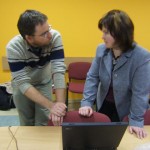
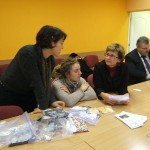
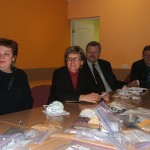
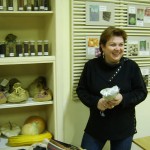
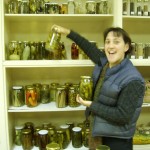
Leave a Reply